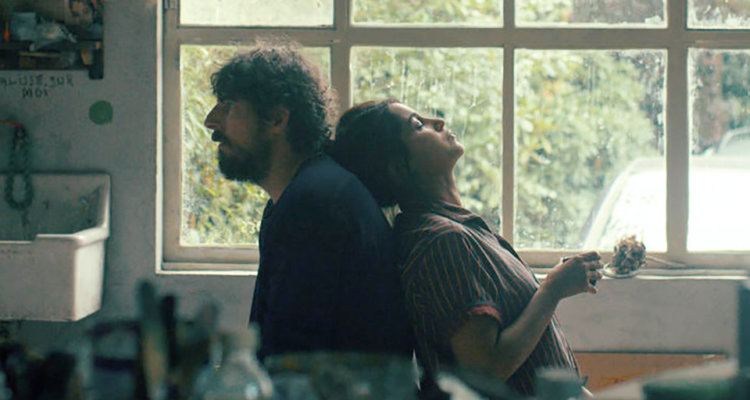There is a moment of genuine tension at the very beginning of Joachim Lafosse’s “The Restless” that is worth your attention. Damien (Damien Bonnard), is swimming with his son Amine (Gabriel Merz Chammah, the grandson of Isabelle Huppert, no less) off a boat on the rocky French coast. They are headed back to shore when Damien suddenly stops the boat and jumps back into the water. He tells Amine, who must be no older than 10-years-old, to bring the motorboat to shore as he will swim there on his own. On the beach lays Damien’s wife Leïla (Leïla Bekhti). She is immediately concerned when Amine arrives on the boat alone. As the sun falls increasingly in the sky she begins to pace on the beach searching the Ocean’s horizon for her husband. When he finally is spotted coming out of the water her body exhales in an immediate sense of relief. As we’ll soon discover, this sort of dangerous drama surrounding Damien is nothing new.
READ MORE: Simon Rex is a suitcase pimp in “Red Rocket” [Cannes Review]
A world premiere in competition at the 2021 Cannes Film Festival, “The Restless” chronicles how this small family copes with Damien’s increasingly erratic bipolar symptoms. A somewhat successful modern artist, he becomes enraptured in his work, often creating too much for his gallery owner’s liking, and it spawns a hyperactive state he never seems cognizant of. When his symptoms are under control he’s a loving father and a husband who can win over Leïla with a euphoric charm. These moments are increasingly fleeting as the “episodes,” as Leïla describes them, two-day binges where Damien does not sleep or take his medicine become more and more frequent. And, as you’d expect, Leïla, an antique conservator trying to support her family, reaches a breaking point.
Mostly confined to the family’s beautiful summer home, Lafosse and cinematographer Jean-François Hensgens collaborate to keep the proceedings as visually alluring as possible. That’s a necessity for a scenario that simply feels all too familiar. And it goes without saying that having Damien as a painter with this condition also veers a bit too much toward genuine cliche (are there any tales of incredible visual artists not burdened by some tragedy or affliction?). The storyline is so predictable, in fact, that despite Lafosse’s skills at crafting a scene the narrative simply leaves you wanting. The actors, on the other hand, carry most of your attention because they simply have to.
Bonnard, best known for his role in Ladj Ly’s “Les Miserables,” gives a performance so energetic and combustible that it almost smothers the viewers’ attention. This is no easy feat, but something is decidedly missing from it all. Perhaps it’s a lack of clarity provided by the six, yes, six screenwriters credited with the script (something more common with studio blockbusters). And yet, despite his efforts, Damien is the one character you understand the least when it matters most. The film’s true revelation is Bekhti who unwraps Leïla’s growing frustration and heartbreak like a blossoming flower. She is the audience’s window to a family that can simply no longer function.
On a historical note, “The Restless” is one of the first films (but not the only one at Cannes) to work the pandemic into the storyline in a manner that is essentially matter-of-fact. There is a moment when an out-of-control Damien goes into a bakery without a mask and causes drama, but the lack of protection is secondary to his embarrassing actions in this small seaside town. Sadly, as evidenced by new mask mandates in France announced during the festival and overseas, this aspect of the story will not seem dated anytime soon. [C+/B-]


